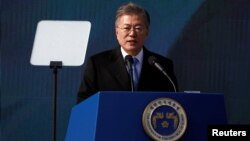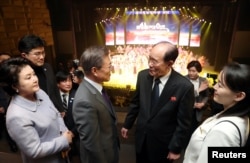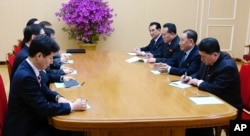South Korean President Moon Jae-in voiced optimism on Tuesday that improving inter-Korean relations can foster denuclearization talks between North Korea and the U.S.
Moon described Monday’s meeting in Pyongyang between South Korean special envoy and National Security Office head Chung Eui-yong and North Korean leader Kim Jong Un, as the beginning of a broader diplomatic process.
"We started our journey for peace and prosperity with the confidence that we can make denuclearization and establish peace on the Korean peninsula with our own efforts," said President Moon while speaking to the Korea Military Academy’s graduation ceremony.
After meeting with Moon, the special envoy will travel to Washington to brief U.S. officials.
KCNA, The North Korean official news agency, described the bilateral meeting in very positive terms, saying Kim Jong Un voiced his "firm will to vigorously advance" inter-Korean ties, that the participants discussed "easing the acute military tensions on the Korean Peninsula" and that they "made a satisfactory agreement." An official in Seoul’s presidential Blue House said the "agreement" was referring to plans for a leaders summit and not talks with the U.S.
The cordial North Korean reception for the diplomatic envoy from Seoul was seen as a courteous response to South Korea’s hosting of the North’s delegation during the PyeongChang Olympics. The opening ceremony delegation included Kim Yo Jong, the sister of the North Korean leader. During her visit to Seoul, Kim conveyed an invitation to Moon to visit Pyongyang for a summit with her brother.
However, Moon has said the proper conditions must first be met before such a summit can be held, and has indicated those conditions include an agreement by the Kim government to engage with the U.S. in talks to end its threatening nuclear program.
Maximum prudence
The South Korean president has also urged U.S. President Donald Trump to lower the threshold for engaging in talks with North Korea. The Trump administration, however, has insisted that Pyongyang agree to halt its nuclear program before negotiations to end sanctions and normalize relations could begin.
North Korea has called the U.S. precondition for talks "preposterous."
In the last two years, North Korea has launched numerous medium and long-range ballistic missiles and conducted two nuclear tests, in large part to develop an operational capability to target U.S. mainland cities with a nuclear-armed intercontinental ballistic missile.
The Trump administration has led international efforts to pressure Pyongyang to halt its nuclear program by imposing tough sanctions that ban billions of dollars worth of North Korean coal, iron ore, clothing products and seafood exports. The Trump administration has also said that, if necessary, it is prepared to use military force as well to eliminate the nuclear threat.
Moon Chung-in, a special advisor to South Korean President Moon Jae-in for diplomacy and national security affairs, has been critical of Trump’s "maximum pressure" approach, and has urged Washington to embrace a "maximum prudence" policy to find a diplomatic solution to prevent the potential for conflict.
"We need to be more realistic and flexible. Realistic means what? North Korea has nuclear weapons from a technical point of view, but you cannot ask North Korea to denuclearize first and then we’ll have a talk with you. That logic wouldn’t work," said Moon at a recent conference organized by The National Committee On North Korea in Washington, D.C.
Military exercises
Meanwhile, South Korea is in a race against time to advance U.S.-North Korea peace talks before tensions likely escalate again in April when joint military drills resume.
With its participation in the recent winter Olympics in South Korea, Pyongyang has been acting with restraint by suspending provocative missile and nuclear tests, and expressing a willingness to improve inter-Korean relations. The Kim government’s sudden embrace of bilateral cooperation is also likely part of a strategy to weaken international support for sanctions and split the U.S.-South Korea alliance.
The U.S. also contributed to the reduced tensions during the Olympics by agreeing to postpone joint military exercises.
But the Olympic truce could come to an end in April when the joint drills are expected to resume. Pyongyang has warned it will respond to the military exercises they claim are threatening rehearsals for invasion, possibly by resuming ballistic missile tests and setting in motion a new cycle of provocation and confrontation.
There has been speculation the drills could be further delayed or reduced in scope if North Korea agrees to direct talks with the U.S. about halting its nuclear program. On Tuesday the South Korean National Defense Ministry refused to say whether the joint military exercises could be altered as part of a diplomatic deal.
"We said that we would talk about its scale and schedule after March 18th, and there is no change in that stance," said Choi Hyun-soo, spokesman for the National Defense Ministry.
China and Russia have been promoting a “freeze for freeze” plan to suspend both North Korean weapons tests and U.S.-South Korea military drills.
The U.S. has so far rejected this plan and defends the annual joint conventional drills as defensive in nature, needed for military readiness and permitted under international law.
Lee Yoon-jee in Seoul contributed to this report.








